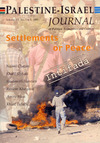Large increases in population, rising standards of living, water scarcity, and pollution are combining to place great stresses on plant, water, and air resources of the Middle East. The essays in this volume address these issues under a number of general themes: agriculture and pastoralism, water, nature and culture, marine environments, and monitoring.
In his chapter entitled "Biodiversity and Sustainable Agriculture in the Fertile Crescent," author A.A. Jaradat of the International Plant Genetic Resources Institute in Aleppo, Syria, proposes a holistic approach to managing the ecosystems of the region to address the degradation of its inherent biodiversity over time. He hypothesizes that food security for future generations will increase through the conservation and utilization of agricultural biodiversity.
Aaron Wolf of Oregon State University examines the topic of "Hydrostrategic Decisionmaking and the Arab-Israeli Conflict." His primary focus is to determine whether or not territory in the Middle East has been sought - in the establishment of boundaries, through warfare, or during negotiations - solely because of its access to water resources. He concludes that such thinking has played some role in political considerations, particularly in Zionist circles during the decades prior to Israel's establishment, but not in military considerations. During negotiations between Israel and its neighbors (Jordan and the Palestinian Authority), Wolf states that water has been a difficult topic of discussion in terms of rights, allocations, and management, but not in terms of territory. Overall, he believes that water seems not to have exacerbated the Arab-Israeli conflict but, rather, as people move away from war toward peace, has induced them to cooperate.
As the editors state, the many rich perspectives included in this volume show that "good information and good communication, even across enduringly difficult political and cultural boundaries, will do more to focus attention on, and move forward toward the solution of environmental issues of critical importance to all inhabitants of the region than any other factors."
Tim Werner

